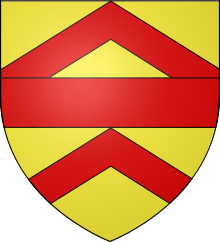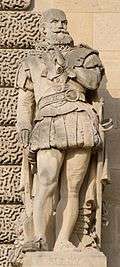Marshal of the Army of God and Holy Church
The Marshal of the Army of God and Holy Church was the title displayed from 1215 by Robert Fitzwalter,[lower-alpha 1] the leader of the baronial opposition against John, King of England and one of the twenty-five sureties of Magna Carta.[1] He was feudal baron of Little Dunmow, Essex[2] and constable of Baynard's Castle, in London, to which was annexed the hereditary office of castellain and chief banneret of the City of London. He was elected by his fellow barons, and held the title at least from when the rebels armed themselves in Lincolnshire and formally defied King John. He retained the title at least until he received back the custody of Hertford castle in June. He died on 9 December 1235,[lower-alpha 2] and is buried in the Priory Church in Little Dunmow.
| Marshal of the Army of God and Holy Church | |
|---|---|
 Seal of Robert Fitzwalter, first Marshal of the Army of God and Holy Church | |
| First Marshal | Robert Fitzwalter |
| Last Marshal | Robert Fitzwalter |
| Appointer | Elective |
| Marshalship began | by 5 May 1215 |
| Date of Marshalship lapsing | 8 December 1235 |
| Current Pretender(s) |  |
Robert I
Marshal of the Army of God and Holy Church Robert fitzWalter the First, Baron of Little Dunmow, Constable of Baynard's Castle, Castellain and Chief Banneret of the City of London, member of the Security Council of the Barons as enshrined in Magna Carta.[1]
Marshal of the Army of God and Holy Church (1215–1235)
| Seal | House | Name | Marshal From | Marshal Until | Reason of Title Lapsing |
|---|---|---|---|---|---|
.png) | Baron FitzWalter | Robert Fitzwalter | by 5 May 1215 | 8 December 1235 | Unclaimed by son, Sir Walter Fitzwalter |
See also
Notes
- Footnotes
- Also spelled FitzWalter, fitzWalter, etc.
- However, Charles Lethbridge Kingsford said in his notes on John Stow's A Survey of London that he died in 1234, not 1235.[3]
References
- Chisholm 1911.
- Sanders 1960, p. 129.
- Kingsford, C. L. (1908). "A Survey of London, by John Stow: Reprinted from the text of 1603": 269–283. Retrieved 23 November 2010. Cite journal requires
|journal=(help);|contribution=ignored (help)CS1 maint: ref=harv (link)